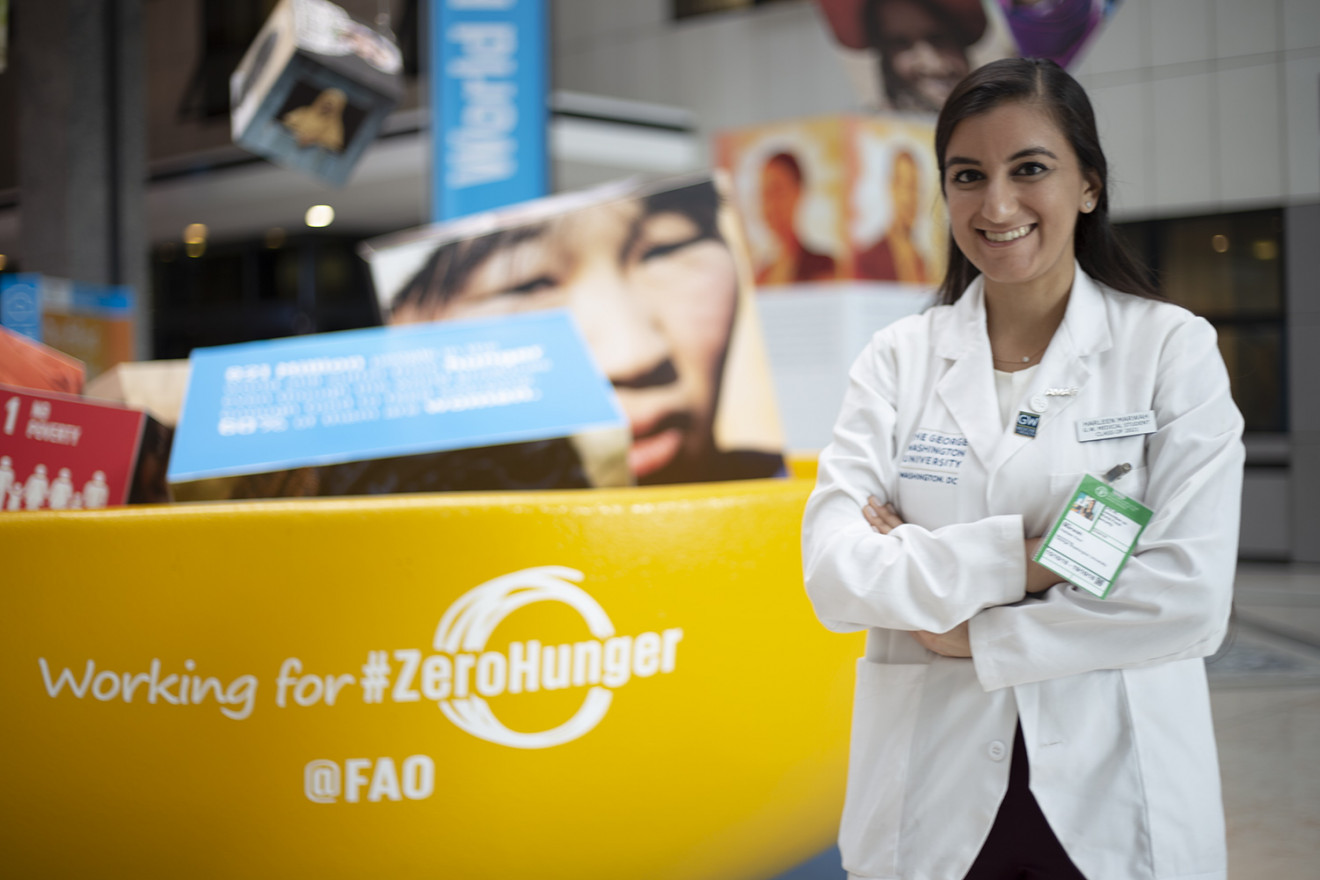
GW School of Medicine student Harleen Marwah at the UN-FAO in Rome. (Planet Forward)

GW School of Medicine student Harleen Marwah at the UN-FAO in Rome. (Planet Forward)
The 45th Committee on World Food Security (CFS45) opened with a question: “Did I do everything I could when there was still a chance?”
President of the United Nations Food and Agriculture Organization (UNFAO), José Graziano da Silva, challenged delegates in the plenary to stay grounded in this question as they would spend the next week discussing and devising solutions to end global hunger by 2030.
Interestingly enough, this was not the first time I found myself facing this powerful question. In my medical school training, we often are asked to take pause on similar questions: “Did I think of every possible diagnosis?” “Did I ask every relevant question?” “Did I evaluate all possible outcomes?” All these questions ultimately boil down to, “Did I do everything I could for this patient when there was still a chance?”
At these United Nations’ meetings, the “patient” is the world and the outcomes to prepare for range from decreased crop diversity to increased strain on resources. Throughout the week, delegates worked to create plans so we could do “everything” we can to keep perhaps our most important patient healthy.
Medicine and health played a notable role in these meetings. The United Nations 2nd Sustainable Development Goal outlines, “A profound change of the global food and agriculture system is needed to nourish today’s 795 million hungry + the additional 2 billion increase in global population expected by 2050.” Queen Letizia of Spain noted a critical element in devising solutions for this goal: “It is not just about feeding, it is about nourishing.”
Throughout the week, it was highlighted that diet is the No. 1 risk factor globally for disease. As the world prepares to reshape our food systems, this statistic and the important health consequences from food cannot be ignored.
From a medical viewpoint, malnutrition is understood to be, a “dysfunction resulting from a failure to consume or to metabolize sufficient nutrients to support the body’s structural and functional integrity,” according to the Sabiston Textbook of Surgery (2017). Malnutrition can be caused by starvation, metabolic disorders, or even obesity due to intake of inappropriate and nutrient poor foods. Prolonged malnutrition can impair organ systems, leading to respiratory insufficiency, delayed wound healing, skeletal muscle wasting, renal atrophy, immunosuppression, or cardiac dysfunction.
While hunger can have devastating impacts on individuals and communities, malnutrition extends beyond hunger. The meetings importantly pointed out that 8 of the 20 countries with the fastest rising obesity rates are in developing parts of Africa and just under 40% of adults in the United States are obese. Malnutrition is a disease of both poverty and wealth. With an increasing trend in non-communicable diseases, like cardiovascular disease or non-alcoholic fatty liver disease, it is imperative to recognize how food trends are influencing the global health landscape.
Given the close interplay between health and food, it is clear that policies to end malnutrition will require a close collaboration with the healthcare sector. Clinicians need a seat at the table to advocate for patients around the world and to offer insight on the downstream health consequences of shifting diets. In order to “do everything we could when there was still a chance,” we need to involve everyone we can while there is still a chance. From tackling problems as far-reaching as the interplay of climate change and global food security to overcoming microscopic obstacles in a clinical setting, solutions are made stronger when diverse perspectives are involved.
—
Editor’s note: This series, A Zero Hunger Future, is generously sponsored by the UN-FAO. All editorial content is created independently. To discover more experiential learning opportunities, email editor@planetforward.org.